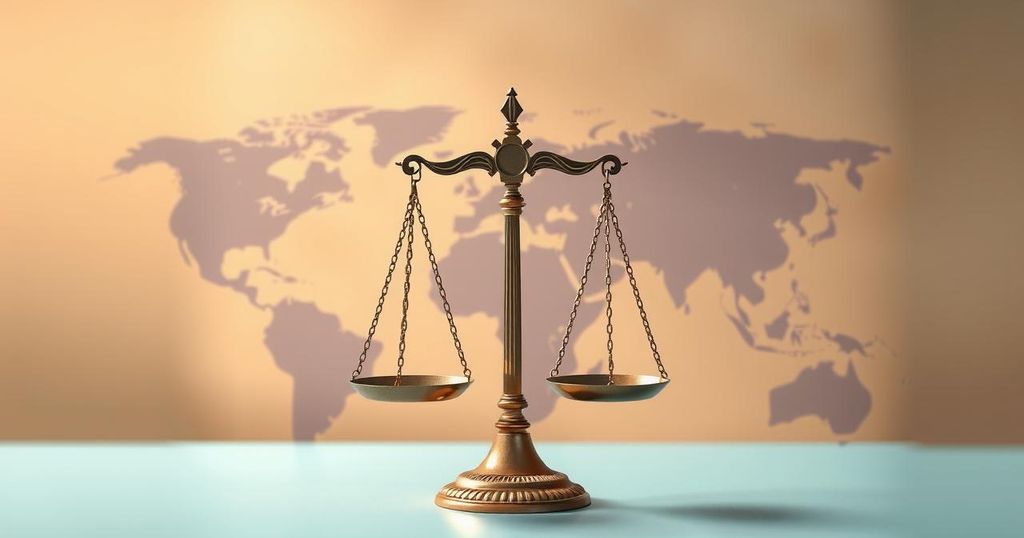Sudan has filed a case against the UAE at the ICJ for complicity in genocide due to its support for the Rapid Support Forces. Evidence points to horrific atrocities against the Masalit population since 2023, raising concerns about international accountability. The lack of support for Sudan could undermine global solidarity principles. Advocates are urged to back Sudan’s case on justice grounds rather than align with specific conflict parties. A ruling in favor of Sudan may restore confidence in the ICJ’s authority and bolster global justice initiatives.
The International Court of Justice (ICJ) has acknowledged Sudan’s case against the United Arab Emirates (UAE), claiming the latter is complicit in genocide due to its support for the Rapid Support Forces (RSF). Since April 2023, the RSF has engaged in violent conflict with the Sudanese Armed Forces (SAF), reportedly committing atrocities against the Masalit group. During a brief period in 2023, thousands of Masalit civilians were killed, and over half a million were displaced, reminding many of prior conflicts in Darfur.
In its accusations, Sudan alleges that the UAE has violated the Genocide Convention by enabling genocidal actions through aid to the RSF. Evidence from various human rights organizations documents the RSF’s violent actions, including systematic killings and destruction of villages. Additional reports of mass graves and survivor testimonies corroborate these claims, indicating clear intent behind these ethnic-targeted assaults.
The documentation surrounding the UAE’s involvement in supplying arms to the RSF is substantial. A UN Security Council report confirmed credible allegations of UAE support via a base in Chad. Flight data also suggests a significant increase in arms transfers from the UAE to Sudan. Investigative findings from credible sources revealed hidden military operations in the region, further validating Sudan’s claims.
Sudan’s legal challenge is complicated by the UAE’s considerable diplomatic and economic influence. With a GDP of $569 billion, the UAE dwarfs Sudan’s $30 billion economy, complicating international support decisions. Past attempts by U.S. lawmakers to halt weapons sales to the UAE indicate the challenges faced when advocating for justice against more powerful nations.
The situation reflects a broader context of inequitable application of international law which can be detrimental not only to Sudan but also to the principles of solidarity within the Global South. Nations supporting South Africa’s legal action against Israel are urged to extend the same solidarity to Sudan, as failure to do so would signify a troubling inconsistency in the application of justice for vulnerable states.
Support for Sudan in this case should be based on principles of justice rather than aligning with any faction within its conflict. Historical evidence indicates the SAF has also committed acts against civilians, underscoring the importance of addressing accountability for all parties involved. An unchecked UAE could further destabilize other states in the Global South, illustrating the broader implications of their influence.
The international legal system faces significant obstacles, and a favorable ruling for Sudan could restore some credibility to the ICJ, promoting accountability for powerful states. While the UAE may invoke legal reservations regarding its participation in the ICJ case, scholars argue such reservations contradict the spirit of the Genocide Convention, aimed at international accountability.
Ignoring Sudan’s plight may result in a power vacuum, weakening the autonomy of states in the Global South, and perpetuating a cycle of exploitation by more powerful actors. Thus, the consequences of silence on this issue could be severe, reinforcing a world order where wealth overshadows justice.
In conclusion, Sudan’s case against the UAE at the ICJ is pivotal for both Sudan and the integrity of international justice. The documented evidence of the UAE’s complicity in genocidal acts through its support of the RSF must compel the Global South to stand united against such violations. Failure to support Sudan in its pursuit of accountability would undermine principles of solidarity and may invite further exploitation in the international arena. The stakes are high, as a successful ICJ ruling could reaffirm the commitment to justice and accountability in international law, emphasizing the need for solidarity in confronting powerful nations.
Original Source: foreignpolicy.com






